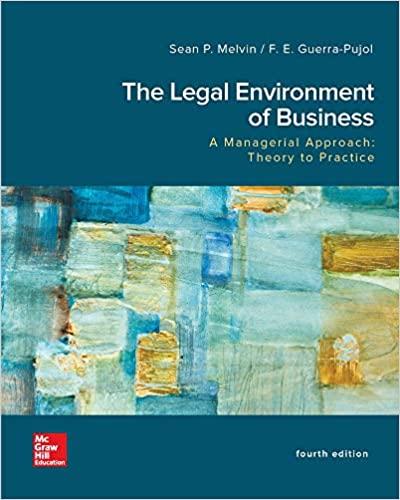Question
Case 2.3 Klipsch Group, Inc. v. PRO E-Commerce Limited United States Court of Appeals, Second circuit, 880 F.3d 620 (2018).FactsKlipsch Group, Inc. makes sound equipment,
Case 2.3 Klipsch Group, Inc. v. PRO E-Commerce Limited United States Court of Appeals, Second circuit, 880 F.3d 620 (2018).FactsKlipsch Group, Inc. makes sound equipment, including headphones. Klipsch filed a suit in a federal district court against PRO E-Commerce Limited, a Chinese corporation. Klipsch alleged that PRO had sold $5 million in counterfeit Klipsch products. PRO claimed that the sales of relevant products amounted to less than $8,000 worldwide. In response to discovery requests, PRO failed to timely disclose the majority of the responsive documents in its possession. PRO also restricted Klipsch's access to its e-data. The court directed ePRO to impose a litigation hold on the custodians of the data to preserve evidence, but the defendant failed to do so. This led to the deletion of thousands of documents and significant quantities of data. Klipsch spent $2.7 million on a forensic examination to determine what had been blocked, what had been lost, and what might and might not be recovered. The court concluded that ePRO willingly engaged in spoliation of e-evidence. For this misconduct, the court imposed sanctions, including an order to pay Klipsch the entire $2.7 million for its restorative discovery efforts. ePROappealed.IssueWas it appropriate to impose on PRO the cost of Klipsch's corrective discovery efforts?DecisionYes. The U.S. Court of Appeals for the Second Circuit affirmed the imposition of the sanctions. "The district court's award properly reflects the additional costs PRO imposed on its opponent by refusing to comply with its discovery obligations."ReasonePRO failed to comply with its discovery obligations, which caused Klipsch to incur considerable additional expenses. A party's compliance with a discovery request is not optional. "The integrity of our civil litigation process requires that the parties ... carry out their duties to maintain and disclose the relevant information in their possession in good faith." Discovery depends on the parties' voluntary preservation of evidence and disclosure of relevant information when asked. Noncompliance increases the cost of litigation. Discovery sanctions are appropriate to discourage delaying tactics and related misconduct. In this case, PRO argued that the sanctions were "disproportionate." The court concluded, "The proportionality that matters here is that the amount of the sanctions was plainly proportionate indeed, it was exactly equivalent to the costs PRO inflicted on Klipsch in its reasonable efforts to remedy PRO's misconduct."

Step by Step Solution
There are 3 Steps involved in it
Step: 1

Get Instant Access to Expert-Tailored Solutions
See step-by-step solutions with expert insights and AI powered tools for academic success
Step: 2

Step: 3

Ace Your Homework with AI
Get the answers you need in no time with our AI-driven, step-by-step assistance
Get Started


